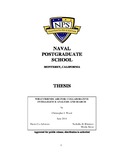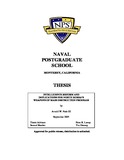What friends are for: collaborative intelligence analysis and search
| dc.contributor.advisor | Dimitrov, Nedialko B. | |
| dc.contributor.advisor | Kress, Moshe | |
| dc.contributor.author | Wood, Christopher J. | |
| dc.date | Jun-14 | |
| dc.date.accessioned | 2014-08-13T20:18:05Z | |
| dc.date.available | 2014-08-13T20:18:05Z | |
| dc.date.issued | 2014-06 | |
| dc.identifier.uri | https://hdl.handle.net/10945/42755 | |
| dc.description.abstract | Intelligence analysts face a glut of information and limited time to identify which information is relevant. Also, they are unaware of other analysts with similar intelligence problems, preventing collaboration and often causing intelligence failure. To identify relevant information, analysts use adopted commercial search engines designed for internet-sized databases containing hyperlinked web-pages that are not effective on intelligence databases consisting of non-hyperlinked documents. This thesis outlines a model to fundamentally increase search effectiveness and collaboration by using a social network of like-minded users based on user biographies and search behavior. After entering a query, the likelihood of returning a relevant document is increased by leveraging data from other, similar users. The model goes beyond standard search engine design by presenting similar analysts for collaboration and presenting relevant documents without queries. Our framework is mathematically grounded in a Markov random field information retrieval model and recent developments in recommender systems. We build and test a prototype system on datasets from the National Institute of Standards & Technology. The test results combine with computational sensitivity analyses to show significant improvements over existing search models. The improvements are shown to be robust to high levels of human error and low similarity between users. | en_US |
| dc.description.uri | http://archive.org/details/whatfriendsrefor1094542755 | |
| dc.publisher | Monterey, California: Naval Postgraduate School | en_US |
| dc.rights | This publication is a work of the U.S. Government as defined in Title 17, United States Code, Section 101. Copyright protection is not available for this work in the United States. | en_US |
| dc.title | What friends are for: collaborative intelligence analysis and search | en_US |
| dc.type | Thesis | en_US |
| dc.contributor.department | Operations Research | |
| dc.subject.author | Intelligence Community | en_US |
| dc.subject.author | information retrieval | en_US |
| dc.subject.author | recommender systems | en_US |
| dc.subject.author | search engines | en_US |
| dc.subject.author | social networks | en_US |
| dc.subject.author | user profiling | en_US |
| dc.subject.author | Lucene | en_US |
| dc.subject.author | robust design | en_US |
| dc.subject.author | collaborative systems | en_US |
| dc.description.recognition | Outstanding Thesis | en_US |
| dc.description.service | Captain, United States Marine Corps | en_US |
| etd.thesisdegree.name | Master of Science in Operations Research | en_US |
| etd.thesisdegree.level | Masters | en_US |
| etd.thesisdegree.discipline | Operations Research | en_US |
| etd.thesisdegree.grantor | Naval Postgraduate School | en_US |
| dc.description.distributionstatement | Approved for public release; distribution is unlimited. |
Files in this item
This item appears in the following Collection(s)
-
1. Thesis and Dissertation Collection, all items
Publicly releasable NPS Theses, Dissertations, MBA Professional Reports, Joint Applied Projects, Systems Engineering Project Reports and other NPS degree-earning written works. -
2. NPS Outstanding Theses and Dissertations





